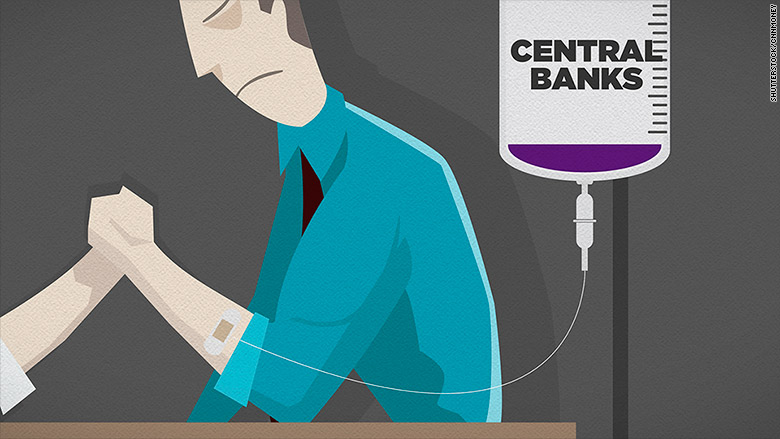Financial Markets and Economy
Busy Times As Fed Meets and Key Economic Data Loom (Forbes)
This coming week is packed with important economic data, meetings of the U.S. Fed and the Bank of Japan, and a quadruple witching, giving investors plenty to digest in the days to come. Economists don’t expect the Fed to make any interest rate moves.

One chart tells you why negative rates are hurting European banks (Business Insider)
Central banking is upside down.

 Why Wall Street is Dead Wrong About Cheniere Energy (Fox Business)
Why Wall Street is Dead Wrong About Cheniere Energy (Fox Business)
Like many energy names, Cheniere Energy (NYSEMKT: LNG) has struggled in the current depressed commodity environment. In the face of all this, Cheniere became the first company in the continental U.S. to export LNG on February 24, 2016. As Cheniere's chairman and interim CEO Neal Shear said, "This historic event opens a new chapter for the country in energy trade and is a significant milestone for Cheniere as we prepare Train 1 for commercial operations."
A huge new discovery in economics: The zero bound *is* absolute, after all (Business Insider)
People stopped talking about the "zero bound" several months ago, as central banks breezed through 0% to set negative interest rates far below zero. Zero wasn't a "bound" for anything, it turned out.
American Express: No Quick Fix (Bloomberg Gadfly)
Well, that's if you take the word of CEO Ken Chenault, whose efforts to appease critics at AmEx's annual investor day on Thursday met tired ears. Promises to boost revenue echoed what the 15-year CEO has been espousing the last few years. Its stock, which has fallen 27 percent in the past year, barely budged.
 India's new gold sales tax is having a huge impact (Business Insider)
India's new gold sales tax is having a huge impact (Business Insider)
Last week, I talked about big changes afoot in the world’s top gold-consuming nation, India. With the government there imposing a surprise sales tax on gold, in an apparent attempt to further curb demand.
And the last few days, things got a lot more serious for the gold market in this critical locale.
 Pfizer’s Eager to Go, but the Market Has Doubts (NY Times)
Pfizer’s Eager to Go, but the Market Has Doubts (NY Times)
The stock market isn’t convinced that the biggest tax inversion merger on the horizon — Pfizer’s pending blockbuster deal with Allergan — will be concluded without major problems.
That’s what the share prices of the two pharmaceutical companies are telling us. While their adjusted prices should be converging — if you assume the merger will be completed without significant impediments — the spread remains unusually wide.
Trading With Your Brain–And Your Gut (Trader Feed)
It's been said that many traders who claim to trade based on intuition are actually more into wishin'. The gut can be used as a great excuse for not using the brain. The reality is that the gut and brain can act in harmony, and it is the trading plan that accomplishes this synthesis.
Active Funds Whiff Again (ETF)
The year-end 2015 S&P Active Versus Passive (SPIVA) scorecard provides yet another example of why—at least when it comes to the overall results of active management relative to appropriate benchmarks—the past is in fact prologue.
 The U.S. Is Pumping All This Oil, So Where Are The Benefits? (NPR)
The U.S. Is Pumping All This Oil, So Where Are The Benefits? (NPR)
The U.S. has ramped up oil production so dramatically that it's joined Saudi Arabia and Russia as one of the world's largest producers. Just glance at the chart below.
Since this surge began in 2008, American production rocketed from 5 million barrels a day to nearly 10 million barrels a day at the high point last year.
 Central banks' steroids aren't working (CNN)
Central banks' steroids aren't working (CNN)
The European Central Bank on Thursday announced a steroid-filled stimulus program in an effort to boost the European economy. European stock markets rallied sharply in response. But within an hour, almost all European markets turned south and soon were in the red.
Politics
 Donald Trump’s Big Lie about the global economy (Washington Post)
Donald Trump’s Big Lie about the global economy (Washington Post)
I tried to watch a Sunday morning talk show that did not include a conversation with Donald Trump and failed miserably. If I have to listen to him, then you have to read about me listening to him. Because the few times he veers into something vaguely policy-related, he repeats the same Big Lie over and over again.
 The Great Let's-Totally-F*ck-Up-Kansas-Experiment Is Nearly Complete (Esquire)
The Great Let's-Totally-F*ck-Up-Kansas-Experiment Is Nearly Complete (Esquire)
If it were possible for Congress to place a state into some kind of democratic receivership, Kansas would be a really good candidate. Governor Sam Brownback—excuse me, twice-elected, god help us, Governor Sam Brownback—turned the state into a lab rat for all the worst policy ideas produced by the modern conservative Republican party. The legislature went gleefully along for the ride.
 A Delegate Drought Ends for Marco Rubio (The Atlantic)
A Delegate Drought Ends for Marco Rubio (The Atlantic)
The good news for Marco Rubio: He won his third primary contest on Saturday and broke a week-long delegate drought, which would normally give him a claim to momentum ahead of the crucial Florida primary on Tuesday. The bad news? The victory was in Washington, D.C., the focus point of Republican voters’ ire this year.
Technology
 Virtual reality app lets you meet others in imaginary places (Mashable)
Virtual reality app lets you meet others in imaginary places (Mashable)
Next to full body sensor suits, one of the main components missing from virtual realityexperiences is the ability to share experiences with others.
Now a new app called vTime hopes to bridge that gap by giving users full VR character avatars that can interact with each other in virtual environments in real-time.
 Modeled After Ants, Teams of Tiny Robots Can Move 2-Ton Car (NY Times)
Modeled After Ants, Teams of Tiny Robots Can Move 2-Ton Car (NY Times)
A group of researchers at the Biomimetics and Dexterous Manipulation Laboratory at Stanford University has been exploring the limits of friction in the design of tiny robots that have the ability to pull thousands of times their weight, wander like gecko lizards on vertical surfaces or mimic bats.
Health and Life Sciences
 Gum disease link with Alzheimer's (BBC)
Gum disease link with Alzheimer's (BBC)
The small study, published in PLOS ONE, looked at 59 people who were all deemed to have mild to moderate dementia.
It is thought the body's response to gum inflammation may be hastening the brain's decline.
When Gene Tests for Breast Cancer Reveal Grim Data but No Guidance (NY Times)
At a time when genetic testing and genetically personalized treatments forcancer are proliferating, buoyed by new resources like President Obama’s $215 million personalized medicine initiative, women with breast cancerare facing a frustrating reality: The genetic data is there, but in many cases, doctors do not know what to do with it.
Life on the Home Planet
 How Traffic Lights Came To Be And Why Green Means Go (Gizmodo)
How Traffic Lights Came To Be And Why Green Means Go (Gizmodo)
Happy Sunday! Welcome to Holy Shift, where we highlight big innovations in the auto and racing industries each week—whether they be necessary or simply for comfort.
When approaching a modern-day intersection, we as drivers don’t need much direction in order to know what to do. We simply see a color—red, yellow or green—and act accordingly. But the meanings of those colors weren’t always so universally known, and the story of how they became so is a bit of an odd one.
 Desert cactus purifies contaminated water for aquaculture, drinking and more (Phys)
Desert cactus purifies contaminated water for aquaculture, drinking and more (Phys)
Farm-grown fish are an important source of food with significant and worldwide societal and economic benefits, but the fish that come from these recirculating systems can have unpleasant tastes and odors. To clean contaminated water for farmed fish, drinking and other uses, scientists are now turning to an unlikely source—the mucilage or inner "guts" of cacti.



